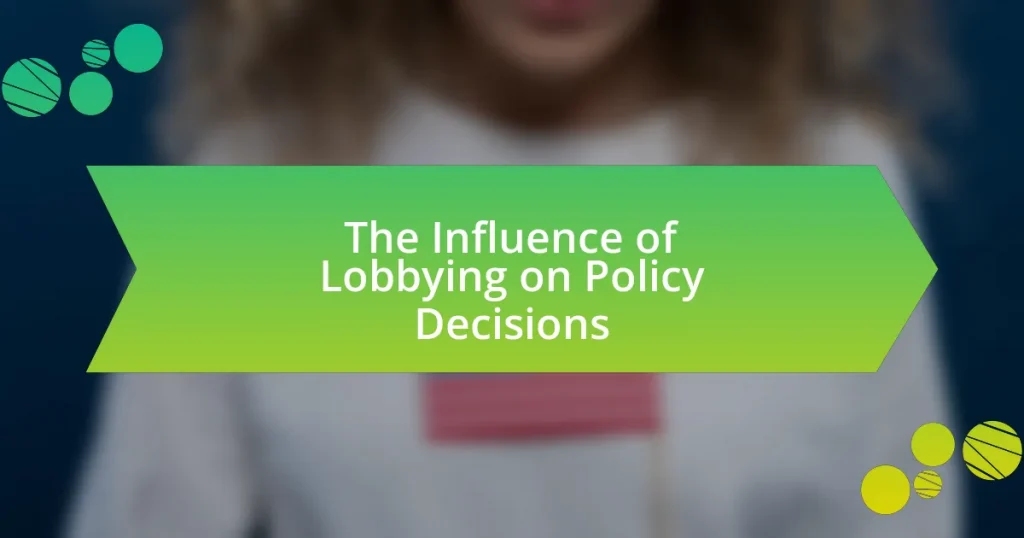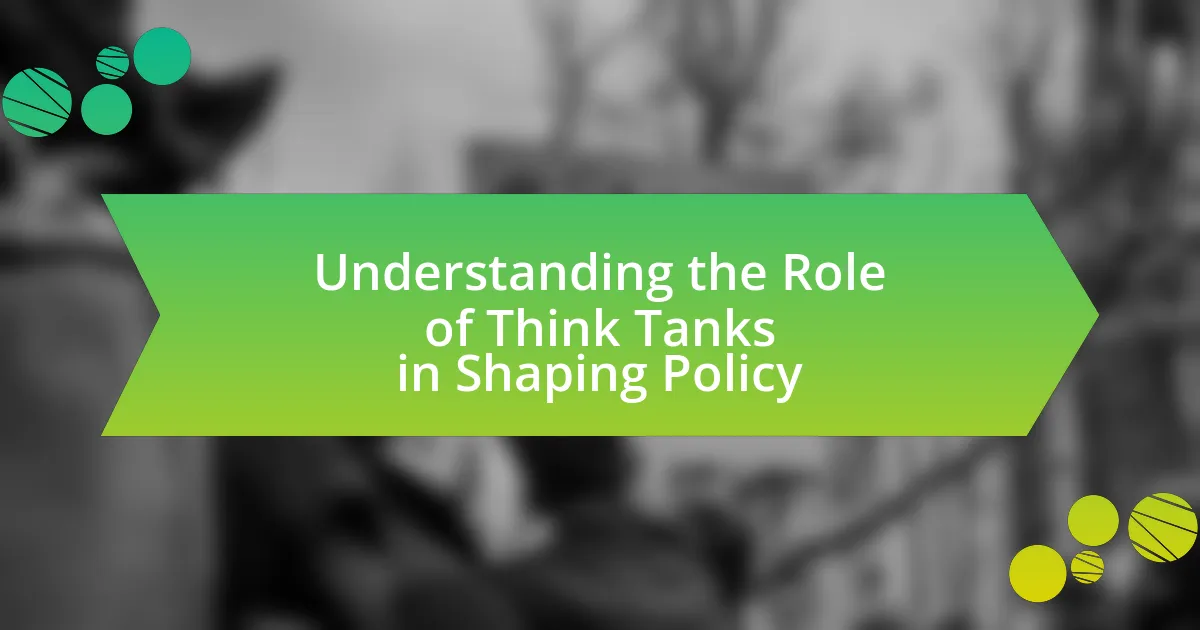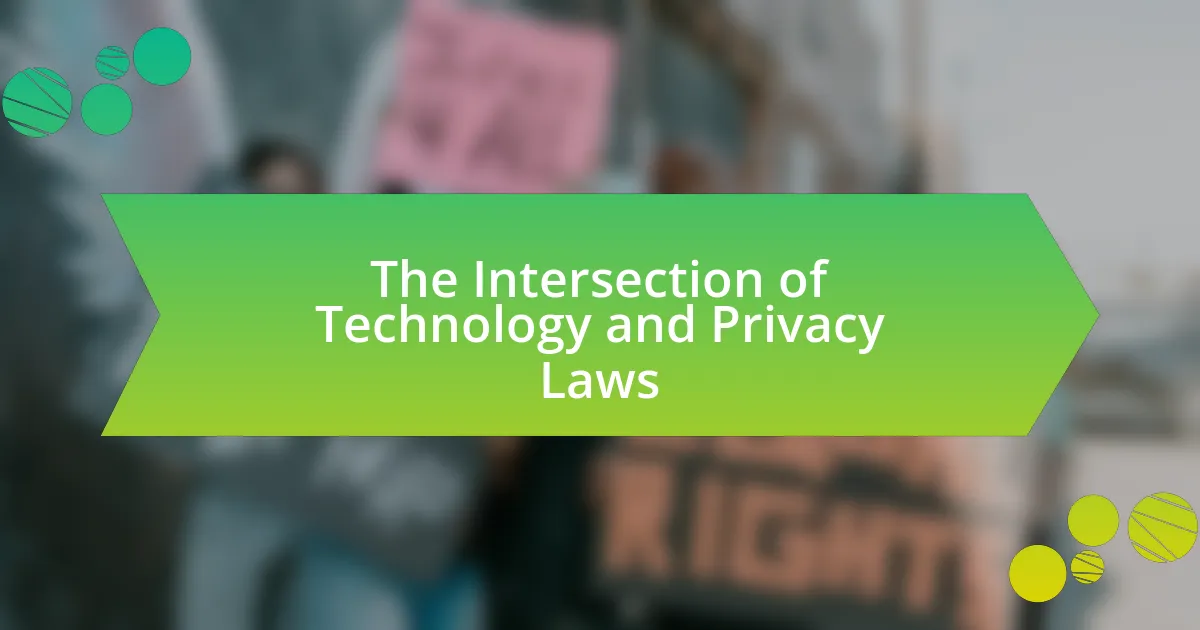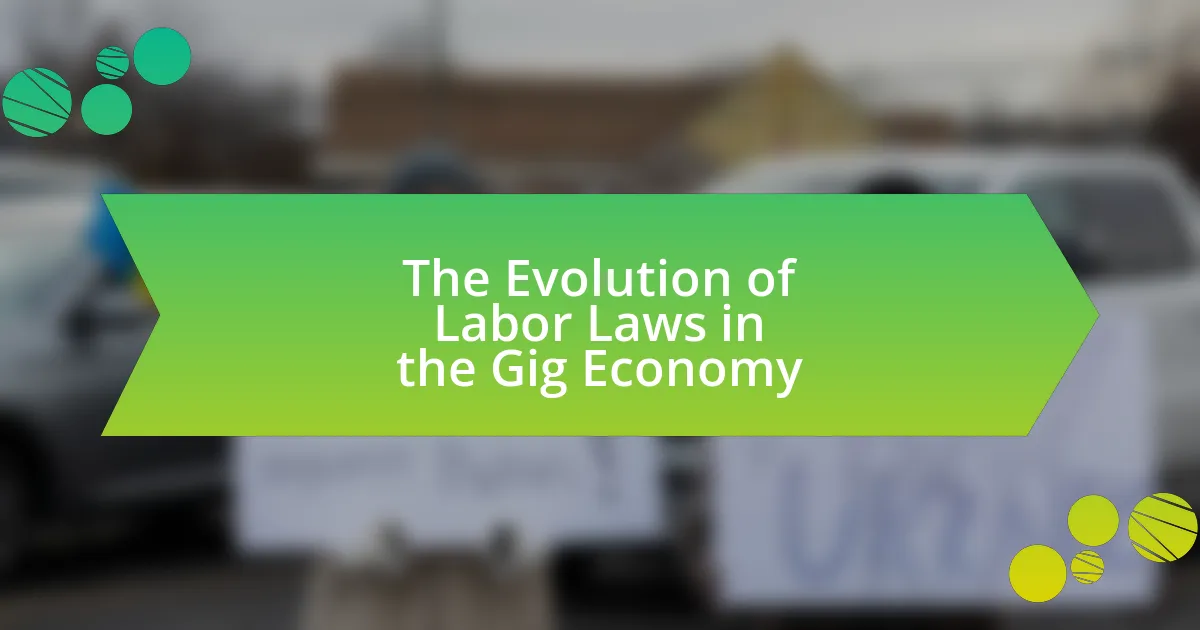Lobbying plays a crucial role in shaping policy decisions by influencing legislative outcomes through advocacy and resource allocation. The article examines how lobbyists, representing various interests such as corporations and non-profits, engage with lawmakers to sway policy through direct communication, information dissemination, and coalition building. It highlights the significant financial resources dedicated to lobbying, with over $3.5 billion spent in the United States in 2020, and discusses the ethical considerations, regulatory frameworks, and the impact of public perception on lobbying practices. Additionally, the article explores the different types of lobbying, the sectors most affected, and strategies for promoting ethical lobbying practices.
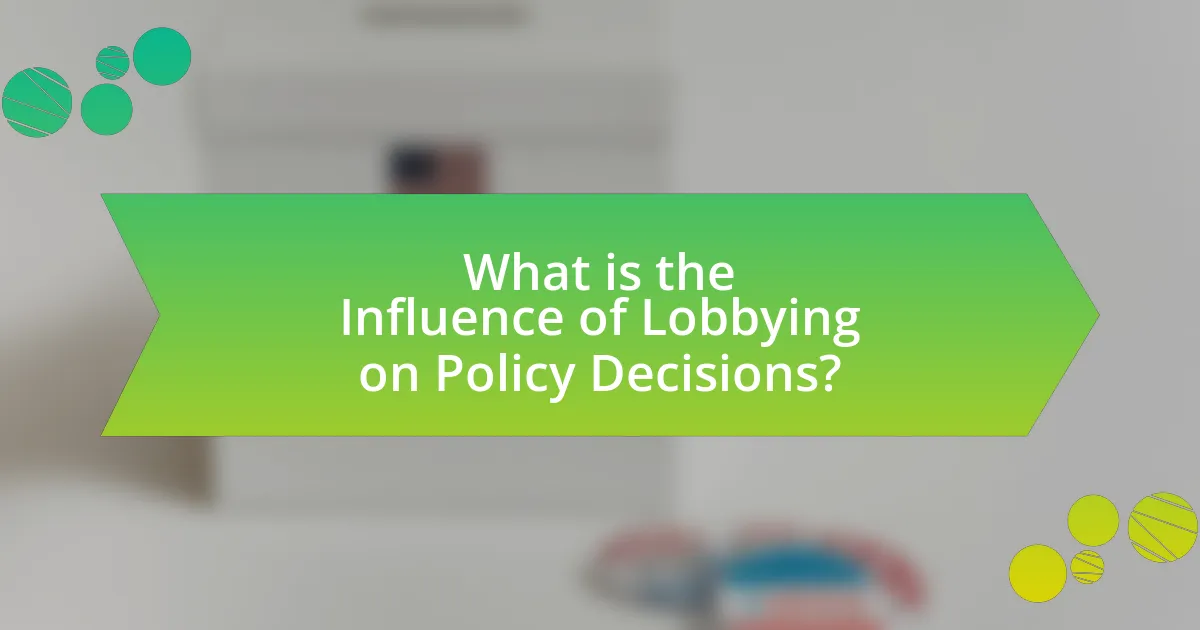
What is the Influence of Lobbying on Policy Decisions?
Lobbying significantly influences policy decisions by shaping legislative outcomes through advocacy and resource allocation. Lobbyists represent various interests, including corporations, non-profits, and trade associations, and they engage in activities such as direct communication with lawmakers, providing research and data, and mobilizing public opinion. For instance, according to a study by the Center for Responsive Politics, in 2020, over $3.5 billion was spent on lobbying in the United States, demonstrating the substantial financial resources dedicated to influencing policy. This financial power allows lobbyists to gain access to decision-makers, thereby impacting the legislative process and the formulation of public policy.
How does lobbying impact the legislative process?
Lobbying significantly impacts the legislative process by influencing lawmakers’ decisions and shaping policy outcomes. Lobbyists represent various interest groups, providing information, resources, and advocacy to persuade legislators to support specific legislation. For instance, a study by the Center for Responsive Politics found that in 2020, over $3.5 billion was spent on lobbying in the United States, demonstrating the substantial financial resources dedicated to influencing policy. This financial influence often translates into access to lawmakers, allowing lobbyists to present their perspectives and data, which can sway legislative priorities and outcomes.
What are the key mechanisms through which lobbying influences policy?
Lobbying influences policy primarily through direct advocacy, information dissemination, and coalition building. Direct advocacy involves lobbyists meeting with lawmakers to persuade them to support specific legislation, often backed by research and data that highlight the benefits of the proposed policies. Information dissemination occurs when lobbyists provide lawmakers with reports, studies, and expert opinions that shape their understanding of issues, thereby influencing their decisions. Coalition building involves forming alliances with other interest groups to amplify their collective voice, which can lead to greater political pressure on policymakers. For instance, the American Medical Association successfully lobbied for healthcare reforms by leveraging its extensive network and providing critical data on public health outcomes, demonstrating the effectiveness of these mechanisms in shaping policy.
How do lobbyists interact with policymakers?
Lobbyists interact with policymakers primarily through direct communication, advocacy efforts, and providing information or expertise on specific issues. They often arrange meetings, participate in hearings, and engage in grassroots campaigns to influence legislative outcomes. For instance, according to the Center for Responsive Politics, in 2020, over $3.5 billion was spent on lobbying in the United States, highlighting the significant resources dedicated to shaping policy decisions. This financial investment underscores the strategic importance of these interactions in the policymaking process.
Why is lobbying considered a significant factor in policy-making?
Lobbying is considered a significant factor in policy-making because it enables interest groups to influence legislators and government officials directly. This influence is often exerted through the provision of information, expertise, and resources that can shape legislative agendas and outcomes. For instance, according to the Center for Responsive Politics, in 2020, over $3.5 billion was spent on lobbying in the United States, highlighting the financial resources dedicated to swaying policy decisions. This substantial investment underscores the role of lobbying in ensuring that specific interests are represented in the legislative process, ultimately affecting the laws and regulations that govern society.
What historical examples illustrate the impact of lobbying on policy decisions?
Historical examples that illustrate the impact of lobbying on policy decisions include the American Medical Association’s (AMA) influence on healthcare legislation in the 1960s and the National Rifle Association’s (NRA) role in shaping gun control laws. The AMA successfully lobbied against the introduction of a national health insurance program, arguing that it would undermine the quality of care, which contributed to the failure of such proposals during that era. Similarly, the NRA has consistently lobbied against stricter gun control measures, influencing legislation and public policy through significant campaign contributions and grassroots mobilization, particularly evident after events like the Sandy Hook Elementary School shooting in 2012, where their lobbying efforts helped prevent the passage of comprehensive gun control laws. These examples demonstrate how organized lobbying can significantly sway policy outcomes in favor of specific interests.
How do public perceptions of lobbying affect its influence?
Public perceptions of lobbying significantly affect its influence by shaping the legitimacy and acceptance of lobbying efforts among policymakers and the general public. When the public views lobbying as a necessary part of democracy, it can enhance the effectiveness of lobbyists in advocating for specific interests. Conversely, negative perceptions, often fueled by scandals or perceived corruption, can diminish the credibility of lobbyists and reduce their ability to sway policy decisions. For instance, a 2020 Pew Research Center survey indicated that 70% of Americans believe that lobbying serves special interests rather than the public good, which can lead to increased scrutiny and resistance against lobbying efforts. This dynamic illustrates how public sentiment directly impacts the power and effectiveness of lobbying in shaping policy outcomes.
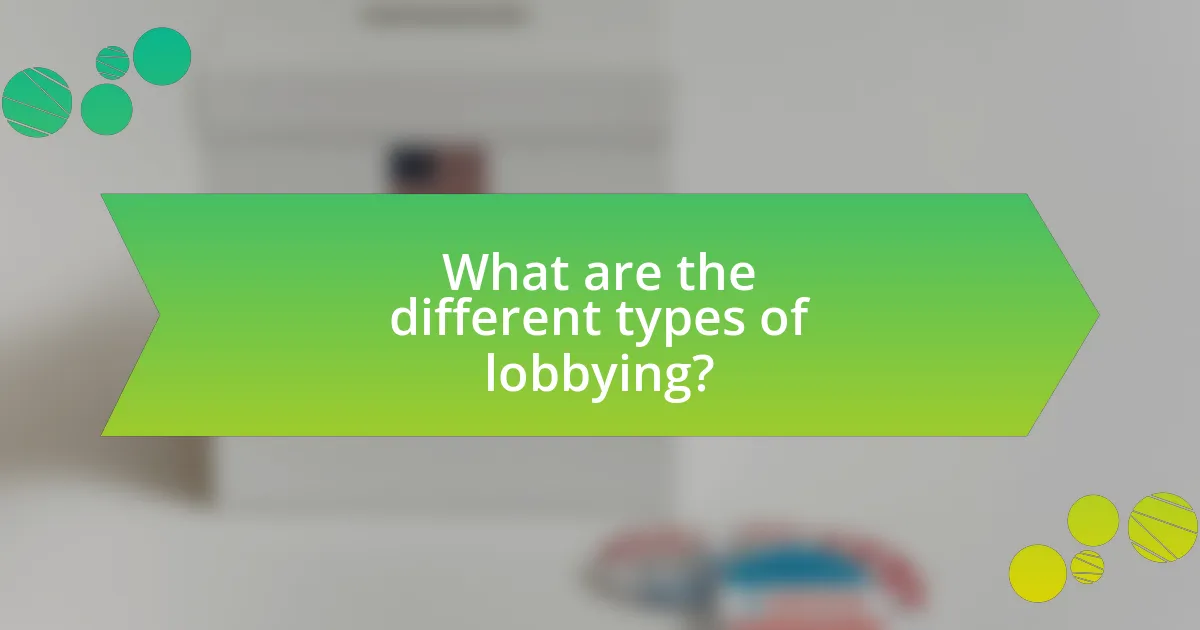
What are the different types of lobbying?
There are several types of lobbying, including direct lobbying, grassroots lobbying, and coalition lobbying. Direct lobbying involves direct interaction with lawmakers or government officials to influence legislation or policy decisions. Grassroots lobbying focuses on mobilizing the public to contact their representatives, thereby creating pressure from constituents. Coalition lobbying occurs when multiple organizations or interest groups come together to advocate for a common cause, amplifying their influence. Each type plays a distinct role in shaping policy outcomes and reflects different strategies employed by interest groups to achieve their objectives.
What distinguishes direct lobbying from grassroots lobbying?
Direct lobbying involves direct interaction between lobbyists and policymakers to influence legislation or regulation, while grassroots lobbying mobilizes the general public to contact legislators and express their views. In direct lobbying, professional lobbyists often provide specific information and arguments to lawmakers, whereas grassroots lobbying relies on collective public action to demonstrate widespread support or opposition to an issue. This distinction is crucial as direct lobbying typically involves a more formal and structured approach, often utilizing established relationships, while grassroots lobbying emphasizes community engagement and public sentiment to sway decision-makers.
How do strategies differ between direct and grassroots lobbying?
Direct lobbying involves direct interaction with policymakers, utilizing personal relationships and formal communication to influence legislation. In contrast, grassroots lobbying mobilizes the general public to advocate for specific issues, aiming to create a groundswell of support that pressures decision-makers. For example, direct lobbying may include meetings with legislators or providing expert testimony, while grassroots efforts often involve organizing campaigns, petitions, or public demonstrations to raise awareness and encourage constituents to contact their representatives. This distinction highlights that direct lobbying relies on established connections and formal channels, whereas grassroots lobbying seeks to amplify public voice and engagement in the political process.
What are the advantages and disadvantages of each type?
The advantages of lobbying include the ability to provide specialized information to policymakers, which can lead to more informed decisions. For instance, industry experts can offer insights that legislators may lack, enhancing the quality of legislation. Additionally, lobbying can represent diverse interests, ensuring that various perspectives are considered in the policymaking process. However, the disadvantages of lobbying include the potential for disproportionate influence by wealthy entities, which can lead to policies favoring specific interests over the public good. This can result in regulatory capture, where agencies prioritize the interests of lobbyists over broader societal needs. Furthermore, lobbying can contribute to a lack of transparency in government, as the influence of money in politics may obscure the decision-making process.
What role do lobbyists play in various sectors?
Lobbyists play a crucial role in influencing policy decisions across various sectors by advocating for specific interests and shaping legislation. In sectors such as healthcare, lobbyists represent pharmaceutical companies to promote favorable drug pricing and regulatory policies. In the energy sector, lobbyists work for renewable energy firms to push for incentives and subsidies that support sustainable practices. Additionally, in the technology sector, lobbyists advocate for regulations that protect intellectual property and promote innovation. Evidence of their impact can be seen in the significant financial resources allocated to lobbying efforts; for instance, in 2020, the pharmaceutical industry spent over $300 million on lobbying, demonstrating their commitment to influencing healthcare policy.
Which industries are most heavily influenced by lobbying efforts?
The industries most heavily influenced by lobbying efforts include pharmaceuticals, energy, finance, and technology. The pharmaceutical industry spends billions annually on lobbying to shape healthcare policies and drug regulations, with expenditures reaching approximately $300 million in 2020 alone. The energy sector, particularly oil and gas, also invests heavily in lobbying, with over $100 million spent in 2021 to influence environmental regulations and energy policies. The finance industry, including banks and investment firms, has consistently lobbied for favorable regulations, spending around $500 million in 2020. Lastly, the technology sector, particularly companies like Google and Facebook, has increased its lobbying efforts, with expenditures exceeding $20 million in 2021 to influence data privacy and antitrust legislation. These figures demonstrate the significant impact of lobbying on policy decisions across these key industries.
How do lobbyists tailor their approaches to different sectors?
Lobbyists tailor their approaches to different sectors by customizing their strategies based on the specific interests, regulatory environments, and key stakeholders within each sector. For instance, in the healthcare sector, lobbyists may focus on advocating for policies that enhance access to medical services, while in the technology sector, they might emphasize issues like data privacy and innovation. This sector-specific tailoring is supported by research indicating that effective lobbying requires an understanding of the unique challenges and opportunities faced by each industry, allowing lobbyists to craft messages and proposals that resonate with decision-makers.
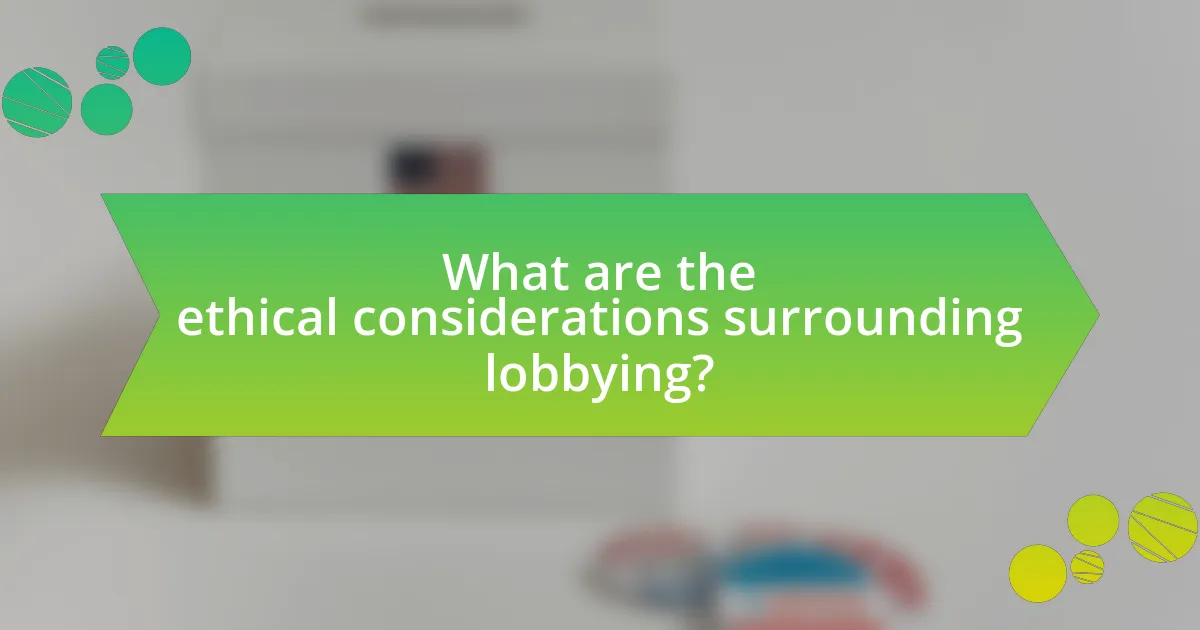
What are the ethical considerations surrounding lobbying?
The ethical considerations surrounding lobbying include transparency, accountability, and the potential for undue influence on policymakers. Transparency is crucial as it ensures that lobbying activities are disclosed, allowing the public to understand who is attempting to influence legislation. Accountability is necessary to hold lobbyists and policymakers responsible for their actions, preventing conflicts of interest. The potential for undue influence arises when lobbyists, often representing powerful interests, can sway decisions in ways that may not align with the public good, leading to policies that favor specific groups over the broader population. For instance, research by the Center for Responsive Politics indicates that in 2020, over $3.5 billion was spent on lobbying in the United States, highlighting the significant financial resources that can be leveraged to influence policy outcomes.
How do regulations govern lobbying activities?
Regulations govern lobbying activities by establishing legal frameworks that dictate how lobbyists can operate, ensuring transparency and accountability. In the United States, the Lobbying Disclosure Act of 1995 requires lobbyists to register and report their activities, including the amount spent on lobbying and the issues they are advocating for. This law aims to provide the public with information about who is attempting to influence government decisions, thereby promoting ethical standards in lobbying practices. Additionally, various state laws impose further restrictions and requirements, enhancing oversight of lobbying activities at local levels.
What are the key laws and regulations that impact lobbying?
The key laws and regulations that impact lobbying include the Lobbying Disclosure Act of 1995, the Honest Leadership and Open Government Act of 2007, and various state-level lobbying regulations. The Lobbying Disclosure Act requires lobbyists to register and disclose their activities, ensuring transparency in lobbying efforts. The Honest Leadership and Open Government Act strengthened the requirements for disclosure and imposed stricter penalties for violations, enhancing accountability among lobbyists. Additionally, many states have their own specific laws governing lobbying practices, which can vary significantly in terms of registration, reporting, and ethical standards. These laws collectively shape the framework within which lobbying operates, influencing how lobbyists engage with policymakers and the public.
How effective are these regulations in curbing unethical lobbying practices?
Regulations aimed at curbing unethical lobbying practices are moderately effective, as evidenced by various studies and reports. For instance, the Lobbying Disclosure Act of 1995 and subsequent amendments have increased transparency by requiring lobbyists to register and disclose their activities, which has led to a reduction in undisclosed lobbying efforts. A 2020 report by the Center for Responsive Politics indicated that increased disclosure requirements have made it more challenging for unethical practices to go unnoticed, thereby promoting accountability. However, loopholes still exist, allowing some unethical lobbying to persist, indicating that while regulations have improved the situation, they are not entirely foolproof.
What are the potential consequences of unethical lobbying?
Unethical lobbying can lead to significant consequences, including the erosion of public trust in government institutions. When lobbyists engage in deceptive practices or exert undue influence, it undermines the integrity of the democratic process. This can result in policies that favor special interests over the public good, leading to increased inequality and social unrest. For instance, a study by the Center for Responsive Politics found that industries with heavy lobbying expenditures often receive favorable legislation, which can distort market competition and harm consumers. Additionally, unethical lobbying can provoke regulatory backlash, prompting stricter laws and oversight that may stifle legitimate advocacy efforts.
How can unethical lobbying undermine public trust in government?
Unethical lobbying can significantly undermine public trust in government by creating perceptions of corruption and favoritism. When lobbyists engage in practices such as bribery or providing misleading information, they distort the democratic process, leading citizens to believe that policy decisions favor special interests over the public good. For instance, a 2018 study by the Pew Research Center found that 75% of Americans believe that lobbying leads to policies that benefit the wealthy and powerful, rather than the average citizen. This perception erodes trust, as citizens feel their voices are marginalized and that government officials prioritize the interests of a few over the needs of the many.
What measures can be taken to promote ethical lobbying practices?
To promote ethical lobbying practices, implementing transparency requirements is essential. This can include mandating lobbyists to disclose their funding sources, the specific issues they are advocating for, and the government officials they meet with. For instance, the Lobbying Disclosure Act in the United States requires lobbyists to register and report their activities, which has increased accountability in lobbying efforts. Additionally, establishing a code of conduct for lobbyists that emphasizes integrity and public interest can further enhance ethical standards. Research shows that jurisdictions with stringent lobbying regulations experience lower instances of corruption and increased public trust in government processes.
What strategies can individuals and organizations use to navigate lobbying effectively?
Individuals and organizations can navigate lobbying effectively by establishing clear objectives, building relationships with key stakeholders, and utilizing data-driven advocacy. Clear objectives help define the desired outcomes and guide lobbying efforts, ensuring that actions are aligned with specific goals. Building relationships with policymakers and their staff fosters trust and facilitates communication, which is crucial for influencing decisions. Utilizing data-driven advocacy involves gathering and presenting relevant statistics and research to support positions, making arguments more compelling. For instance, organizations that leverage data to demonstrate the economic impact of their proposals can significantly enhance their lobbying effectiveness, as evidenced by studies showing that data-backed arguments are more persuasive in policy discussions.
